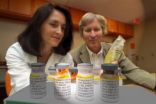Biofuel from inedible plant material easier to produce following enzyme discovery
2010-09-13
(Press-News.org) Researchers funded by the Biotechnology and Biological Sciences Research Council
(BBSRC) have discovered key plant enzymes that normally make the energy stored in wood, straw, and other non-edible parts of plants difficult to extract. The findings, published today in Proceedings of the National Academy of Sciences, can be used to improve the viability of sustainable biofuels that do not adversely affect the food chain.
The team based at the University of Cambridge, and now part of the BBSRC Sustainable Bioenergy Centre (BSBEC), has identified and studied the genes for two enzymes that toughen wood, straw and stalks and so make it difficult to extract sugars to make bioethanol or other plant-derived products. This knowledge can now be used in crop breeding programs to make non-edible plant material that requires less processing, less energy and fewer chemicals for conversion to biofuels or other renewable products and therefore have an even lower overall impact on atmospheric carbon.
The research also increases the economic viability of producing sustainable biofuels from the inedible by-products of crops through increasing our understanding of plant structures.
Lead researcher Professor Paul Dupree said: "There is a lot of energy stored in wood and straw in the form of a substance called lignocellulose. We wanted to find ways of making it easier to get at this energy and extract it in the form of sugars that can be fermented to produce bioethanol and other products."
Lignocellulose is an important component of plants, giving them strength and rigidity. One of the main components of lignocellulose is called xylan. Xylan in wood and straw represents about a third of the sugars that could potentially be used to make bioethanol, but it is locked away. Releasing the energy from lignocellulose is an important challenge to tackle as it will allow the production of fuels from plants in a sustainable way that does not affect the food chain.
Professor Dupree continued: "What we didn't want to do was end up with floppy plants that can't grow properly, so it was important to find a way of making xylan easier to break down without having any major effects."
The team studied Arabidopsis plants (a plant that is easy to study in the laboratory) that lack two of the enzymes that build the xylan part of lignocellulose in plants. They found that although the stems of the plants are slightly weaker than normal, they grow normally and reach a normal size. They also tested how easy it is to extract sugars from these plants and discovered that it takes less effort to convert all the xylan into sugar.
Professor Dupree concluded: "The next stage will be to work with our colleagues who are developing new varieties of bioenergy crops such as willow and miscanthus grass to see if we can breed plants with these properties and to use our discovery to develop more sustainable processes for generating fuels from crop residues. We expect to work closely with industrial collaborators to see how we can quickly transfer this research into real applications for transport fuels."
Duncan Eggar, BBSRC Bioenergy Champion said: "As oil reserves deplete, we must urgently find alternatives to oil-based fuels, plastics, lubricants, and other products. This research is a good example where understanding the fundamental biology of plants gives us the foundation to use plants to produce a raft of important products.
"We know that we can store a tremendous amount of energy from the sun in the form of plant material and at the same time capture atmospheric carbon dioxide.
Working in consort with the other five hubs of the BBSRC Sustainable Bioenergy Centre, this research is aimed at improving our ability to release energy stored in plants in a form that is usable in normal everyday applications."
INFORMATION:
END
ELSE PRESS RELEASES FROM THIS DATE:
2010-09-13
An antibiotic appears to be a safe treatment for stroke and a good companion therapy for tPA, the clot buster that is currently the only FDA-approved drug therapy, researchers report.
A safety study in 60 stroke patients in Georgia, Kentucky and Oregon found the drug well tolerated even at three-and-one-half times the dose currently used for conditions such as rheumatoid arthritis, according to a research team led by the Medical College of Georgia and the University of Georgia.
"It's cheap, safe, well tolerated, easy to administer and can be given with tPA," said Dr. ...
2010-09-13
The theory holds that one of the best ways to attract foreign capital consists in the adoption of a reduced level of taxes in certain cases, and above all, in the provision of legal certainty. This aim of attracting foreign investment inspired the measures for the the Entidades Tenedoras de Valores Extranjeros (ETVE) or Spanish holding companies, adopted in Spain in the late 1990's and which led to the establishment of these companies in Spain by multinational companies. However, things are changing, according the head of the UC3M Research Group of Taxation and Finance ...
2010-09-13
Mom's advice about cleaning your hands may finally be starting to get through.
In the latest observational study sponsored by the American Society for Microbiology and the American Cleaning Institute® (formerly The Soap and Detergent Association), 85% of adults washed their hands in public restrooms, compared with 77% in 2007. The 85% total was actually the highest observed since these studies began in 1996. The results were announced at the Interscience Conference on Antimicrobial Agents and Chemotherapy, an infectious disease meeting sponsored by the American Society ...
2010-09-13
Albany, NY—September 13, 2010— New research on the children of LGBTQ people (lesbian, gay, bisexual, transgender and queer) has unequivocally revealed that they are not only psychologically healthy, but often appear to exhibit better social and academic adjustment and a significantly lower incidence of social problems than their peers. A new article published in the journal Family Process critically examines this research, and how it impacts LGBTQ families.
According to Family Therapist and Social Work professor, Arlene Istar Lev these excellent outcomes might be masking ...
2010-09-13
RUSTON, La – Dr. Bogdan Strimbu, assistant professor of biometrics and quantitative silviculture at Louisiana Tech University's School of Forestry, recently organized and conducted a technical session at the International Union of Forest Research Organization's (IUFRO) XXIII World Congress in Seoul, South Korea.
The Congress, held every five years, brings together industry leaders from the IUFRO's eight divisions to help form the future research direction for the global field of forestry. The group also decides the organization's general course of research and associated ...
2010-09-13
SAN CLEMENTE, Calif. (September 13, 2010) – USGI Medical, Inc., the Incisionless Surgery company, today announced that updated multi-center results confirm durability of the company's Expandable Tissue Anchors™ up to a year or more in a variety of incisionless gastrointestinal (GI) procedures, including use of a ROSE procedure (Repair of Surgery, Endolumenal) to repair dilated tissue after gastric bypass.
These findings, which demonstrate long-term, secure tissue approximation with this scarless "through the mouth" approach in the largest cohort of patients ever reported, ...
2010-09-13
Gardeners are used to cross-breeding flowers to produce pretty petals or sweet scents – now scientists have shown the importance of nature's talent for producing new types of flowers.
DNA analysis of wild evergreen rhododendrons in the Himalayas has suggested that hundreds of species of the plant could be derived from hybrids – cross-breeds between different species.
Their findings may help explain the rich biodiversity of the natural world, as it shows how random pairings of wild plants millions of years ago has led to the development of hundreds of new species that ...
2010-09-13
St. Jude Children's Research Hospital investigators have identified a novel structure in cells that serves as a control switch in the body's system for eliminating damaged cells and also offers new therapeutic potential.
The findings provide fresh insight into the machinery at work as cells ramp up production of p53 protein following DNA damage. The p53 protein plays a critical role in how cells respond to the stress that damages DNA. The gene that carries instructions for making p53 protein is the most commonly mutated gene in human cancers.
Investigators also identified ...
2010-09-13
A team of Welsh scientists have successfully cloned a human virus offering new hope for the treatment of potentially life-threatening diseases.
Human cytomegalovirus (HCMV) is a major infectious cause of congenital malformations worldwide. The virus is also known to cause life-threatening disease in transplant patients and people with HIV/AIDS.
The development of new treatments has been hampered as scientists have been unable to stably replicate HCMV outside the human body.
Dr Richard Stanton from Cardiff University's School of Medicine who led the joint research, ...
2010-09-13
Beyond the orbit of Neptune reside countless icy rocks known as trans-Neptunian objects (TNOs). One of the biggest, Pluto, is classified as a dwarf planet. The region also supplies us with comets such as famous Comet Halley. Most TNOs are small and receive little sunlight, making them faint and difficult to spot.
Now, astronomers using clever techniques to cull the data archives of NASA's Hubble Space Telescope have added 14 new TNOs to the catalog. Their method promises to turn up hundreds more.
"Trans-Neptunian objects interest us because they are building blocks ...
LAST 30 PRESS RELEASES:
[Press-News.org] Biofuel from inedible plant material easier to produce following enzyme discovery


